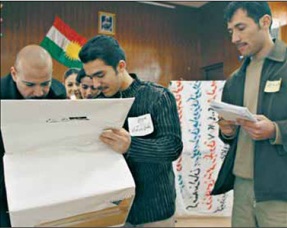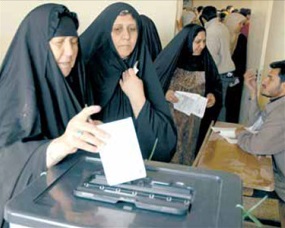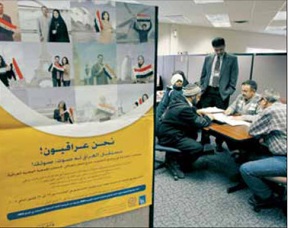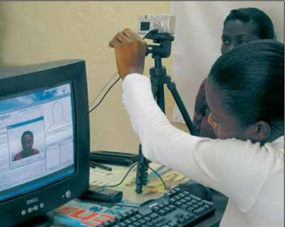Electoral Insight – International Electoral Co-operation
Electoral Insight – March 2006
Chief Electoral Officer's Message
International Electoral Co-operation
Jean-Pierre Kingsley
Chief Electoral Officer of Canada

Jean-Pierre Kingsley
Chief Electoral Officer, Elections Canada
The issues of Electoral Insight that Elections Canada has published in the past few years have dealt largely with electoral participation in Canada, particularly among youth, Aboriginal people, persons with disabilities, and women. In this issue, we broaden the field of view to examine international electoral co-operation and assistance.
Elections Canada has long played an active role on the world scene, offering its experience to new democracies and international organizations that promote democratic electoral processes. Since 1990, Elections Canada has participated in hundreds of international democratic development initiatives in nearly 100 countries. The purpose of such missions is to build mutually beneficial relationships through the exchange of information and expertise, so that all those involved learn from the experience. Our participation in international projects has included advising on constitutional and election law provisions, as well as all aspects of election administration. It has also involved conducting pre-election evaluations to assess the electoral environment and identify potential problems, training election officials, and developing and conducting voter education programs.
International assistance and co-operation ranges in effort from a small, one-time sharing of information to long-term, multifaceted partnerships with other electoral management bodies. An example of the latter is our long-standing relationship with Mexico's Federal Electoral Institute (IFE), which began in 1993 with the visit by a group of Mexican electoral administrators to Elections Canada. Over the years, Elections Canada and IFE have collaborated on a number of important initiatives, including a series of trilateral conferences (with the United States) on various aspects of electoral administration, the signing of two five-year bilateral co-operation agreements (in 1996 and 2001), and professional exchange visits of electoral personnel. I am pleased that this issue of Electoral Insight includes an article by Manuel Carrillo, Chief of Staff for International Affairs at IFE.
Electoral assistance and co-operation can also take the form of comprehensive international evaluation missions. Two Canadian-funded international missions, which I chair, are described below. The approach taken by these missions is one of accompaniment – that is, the establishment of close ties with the electoral commissions involved, over and above traditional electoral observation, with peer review and the sharing of analyses and information on an ongoing basis. This approach, though unique to the world of international electoral observation, is in reality a continuation of the kind of relationship Elections Canada has developed and fostered for a number of years on a bilateral basis. As illustrated by our relationship with IFE, it is an approach based on respect for the independence of the partner electoral commission, as well as for the culture and history of the country.

The International Mission for Iraqi Elections (IMIE) is a recent example of such a relationship. This model of electoral co-operation has received international recognition for its peer-to-peer approach and systematic examination of all aspects of electoral administration, including the legal framework for elections, voter registration and education, the role of the media, vote counting procedures, and electoral complaints processes, to name a few examples. Each aspect is the focus of an in-depth assessment by an internationally recognized expert. The mission is led by a steering committee composed of independent electoral management bodies from around the world. These two elements – expert assessment and peer-level review by electoral management bodies – combine to make the model unique and credible, and to provide for effective interaction and capacity development with Iraqi electoral authorities.
The IMIE was established on December 20, 2004, as a result of the Iraq Election Monitoring Forum, organized by Elections Canada in Ottawa with the encouragement of the United Nations (UN) and the Independent Electoral Commission of Iraq (IECI), and the financial support of the Canadian International Development Agency. As an impartial and neutral mission, the IMIE's main tasks were to follow the election preparations, make and share informed judgments with the IECI and the international community, and to build capacity and confidence through assessment of identified targets and activities for the three electoral events that took place in 2005. For the January 30, 2005, elections, the IMIE focused on the election process inside Iraq, as well as the out-of-country registration and voting processes. The IMIE used this experience when it followed both the October 2005 referendum and the national elections that took place on December 15, 2005.
The IMIE is made up of independent electoral management bodies from Albania, Australia, Bangladesh, Canada, Ghana, Indonesia, Mexico, Panama, Romania, United Kingdom, Yemen, as well as the Association of Central and Eastern European Election Officials. In addition, the League of Arab States agreed to participate in the mission as an observer. Elections Canada established offices in Amman and Baghdad to lead and coordinate the activities of the mission's Steering Committee.
Not surprisingly, creating such a mission was fraught with many challenges. Initially, no member of the international community offered to monitor the Iraqi elections. The UN could not, because it was directly involved in organizing the elections. Another obstacle was the security situation. Additional security requirements meant that a traditional election observation mission – involving hundreds of international observers visiting thousands of polls on election day – was not possible. Not only would it have been prohibitively expensive, but also restrictions on vehicular traffic, put in place by the Iraqi authorities for three days before and after the election, greatly reduced the ability to carry out monitoring activities. Finally, there was little time left to plan and organize before the first electoral event on January 30, 2005.
Despite the undeniable challenges, the participants at the Ottawa Forum also saw opportunities, and it was in this context that the IMIE was formed. Elections Canada's rationale for participation in the IMIE was simple. Our first motivation was, as always, the democratic rights of the people of Iraq. Regardless of how people felt about the events leading up to this point, what was important now was to help the Iraqi people seize this admittedly fragile and imperfect, but also historic, opportunity to begin building democracy in their country.
Overview of the IMIE concept

Election monitors in training examine a mock-up of a ballot box in Arbil, Iraq, one week before Iraq's January 2005 elections.
The IMIE model for monitoring elections is distinct from, but complementary to, traditional electoral observation. Formed of independent electoral management bodies, the IMIE provides peer review before, during and after the elections. The focus is on providing advice and accompanying the Iraqis over the longer term. Our ultimate goal is to build the institutional capacity of the IECI – and to learn from them in turn.
One key to this approach is the independence of the IECI. The UN played a central role in this respect. From over 1,800 applicants, it drew up the list from which the members of the Commission were chosen. Also key was the presence of thousands of domestic election observers. The IECI accredited some 23,000 non-partisan observers, and 34,000 political entity agents. Many received training from international organizations. The most important point, though, is that these were Iraqi citizens observing their own elections.
In addition to providing pre-election assessment and evaluation of the election itself, the IMIE also provides follow-up after the event. The IMIE offers a process of accompaniment, which is based on respect for the independence of the Iraqi electoral commission, as well as for the culture and history of the country.
IMIE's activities to date
For the January 30, 2005, elections, the IMIE Steering Committee met face-to-face three times, with ongoing virtual contact at all times. In addition, the IMIE organized monitoring for out-of-country registration and voting.
The first Steering Committee meeting took place in London on January 4–5, 2005. There, the Committee agreed to establish a secretariat for the IMIE, with liaison offices in Amman and Baghdad. The Committee also developed a 10-point system of evaluation:
- legal framework
- voter registration
- electoral preparations
- voter information and education
- equitable access to media
- certification of political parties, coalitions and candidates
- pre-polling and post-election complaint procedures
- polling [i.e. voting on election day]
- vote counting and compilation of results
- out-of-country registration and voting
For each area, an international expert was hired to write an assessment report, following criteria and questions laid out by the Steering Committee, and relying on the legal and regulatory documents developed by the IECI, as well as information provided through the Amman and Baghdad offices.

Iraqi women cast their votes in southern Baghdad on election day, January 30, 2005.
During its second meeting in Amman, Jordan, on January 28–30, 2005, the Steering Committee examined six preliminary assessments: legal framework, voter registration, electoral preparations, voter information and education, equitable access to media, and out-of-country registration and voting. Drawing judgments from academic experts and experienced practitioners, the Steering Committee agreed that the Independent Electoral Commission of Iraq had prepared and put in place a sound system, generally in keeping with international standards, although some areas required further review and discussion.
The IMIE released its preliminary report on January 30, after the close of polls in Iraq. This report was sent to the IECI and is posted on the IMIE Web site (www.imie.ca) in English, Arabic and Kurdish.
The third meeting of the Steering Committee took place on March 16–19, 2005, at the UN headquarters in New York City as part of the UN-organized "Iraq Electoral Process Technical Debriefing: Lessons Learned and Upcoming Challenges." The IMIE's main objectives for the meeting were to review the conclusions of the expert assessors (10 reports), debrief and obtain the feedback of the IECI and others; make concrete recommendations for the forthcoming electoral events in Iraq – namely, the constitutional referendum and general election; and explore future IMIE collaboration with the IECI and the UN. The information provided at the meetings was useful for the drafting of the IMIE's final report, which is available on the IMIE Web site in English, Arabic and Kurdish.
For the October 15, 2005, constitutional referendum and the December 15, 2005, general elections, the IMIE process was similar to the one used for the January 30 elections: expert assessors evaluated key areas of the electoral process, and the Steering Committee drew on these assessments when evaluating each electoral event. For the October referendum, the IMIE Steering Committee met on October 14–16, 2005, in Amman, Jordan. A preliminary statement on the referendum was released on October 15 and is available in three languages on the IMIE Web site.
For the December 15 general elections, the IMIE Steering Committee met on December 12–16 in Amman, Jordan. Drawing on a number of information sources, including expert assessments, the IMIE field office in Iraq, international monitors and domestic observers, the Steering Committee released its interim findings on the electoral process on December 15, 2005. The interim report addresses six target assessment areas: legal framework, electoral preparations, voter information and education, pre-electoral complaints procedures, voter registration and certification of political entities. While the Steering Committee found that the electoral preparations generally met international standards, it highlighted some technical and procedural issues of concern and made a number of recommendations. The interim report and accompanying press release are posted on the IMIE Web site in the three languages noted above.
In early January 2006, the IMIE sent a four-person team to Baghdad to undertake a follow-up assessment to its interim report. The team included Ali Al Jaroushe and Dussouki Tharwat Abaza from the League of Arab States, Douglas Rowland, a former Canadian parliamentarian and Rafael López-Pintor, a European academic. They undertook assessments of post-election complaints, political entity participation and post-election audits conducted by the IECI. In its report, released on January 19, 2006, and available on the IMIE Web site, the team identified both the achievements and shortcomings of the Iraqi electoral process. Lessons learned from this exercise are that technical expertise is both welcomed and needed to finely examine the workings of electoral administration in transitional states and, where appropriate, lend international, public credibility to emerging democratic processes.
In late February 2006, the IMIE Steering Committee held a debriefing meeting with the IECI. A report making recommendations to strengthen the Iraqi electoral process for the future was prepared and posted on the IMIE Web site.
Out-of-country registration and voting

Iraqi Canadians register on January 17, 2005, at a polling station in Ottawa for out-of-country voting.
Another important element of both the January 30 and the December 15 elections was the out-of-country registration and voting process. For the January elections, the IECI mandated the International Organization for Migration (IOM) to conduct the out-of-country vote in 36 cities across 14 countries. For the December elections, the IECI itself conducted the out-of-country vote in 48 cities across 15 countries. The IMIE sought and obtained accreditation to monitor the out-of-country registration and voting process for both sets of elections.
For the January 30 out-of-country voting program, the IMIE recruited more than 100 monitors in 13 of the 14 countries. For the December 15 elections, the IMIE deployed 400 international monitors in the 15 countries where out-of-country voting took place. These monitors were given detailed monitoring forms, which they returned to the IMIE for compilation and analysis. Their observations form the basis for the IMIE's assessments of the Iraq out-of-country voting program, which are available on the IMIE Web site in the three languages noted above.
The 2005 Iraqi electoral cycle proved to be an important learning experience for all involved and showed that the IMIE can be a model for future electoral assistance missions – in addition to international observers. Over the longer term, the IMIE is prepared to accompany the IECI as a professional and skilled independent electoral management body and to help the Iraqi people as they build and strengthen their democratic process.
Monitoring elections in Haiti

Voter registration for Haiti's elections, including the production of identification cards, was extended by several weeks to enable more Haitians to vote.
The IMIE experience is now being put to use in Haiti. At an international forum held in Montréal under the auspices of Elections Canada on June 16 and 17, 2005, the heads of eight independent electoral management bodies agreed to establish the International Mission for Monitoring Haitian Elections (IMMHE). Beginning in early August 2005, the IMMHE established a secretariat in Port-au-Prince, deployed long-term observers throughout the country, and is working in co-operation with other international observers and domestic observation groups to monitor election preparations in Haiti. For the first round of legislative and presidential elections, which took place on February 7, 2006, the IMMHE also deployed 127 short-term international observers across Haiti's 10 departments. The goal is to provide peer review and advice to the Conseil électoral provisoire – Haiti's provisional electoral council. In this way, the IMMHE can contribute to building the confidence and capacity of key stakeholders, and provide support for the overall legitimacy of the electoral process in Haiti. The IMMHE's reports are available on its Web site (www.mieeh-immhe.ca) in five languages.
Articles in this issue
As noted above, this issue of Electoral Insight examines international electoral co-operation and assistance. Some articles in this issue focus on general and technical features of such co-operation. Democracy International's Eric C. Bjornlund, author of the compelling book Beyond Free and Fair: Monitoring Elections and Building Democracy, explains "parallel vote tabulations" to illustrate how they are preferable to exit polls in assessing the legitimacy of vote counts in transitional or post-conflict elections. Steven Griner of the Organization of American States contributes a comparative analysis of political party and campaign financing in Latin America, North America and the Caribbean. The study, carried out under the auspices of the Inter-American Forum on Political Parties, is intended to assist political reform and supportive international organizations.
We are also pleased to feature some important case studies of countries that have undertaken international electoral assistance. Manuel Carrillo of the Federal Electoral Institute provides information about Mexico's electoral assistance to other countries. The University of Waterloo's Peter Woolstencroft, together with John Fraser, formerly of the National Democratic Institute for International Affairs, identify the rising number of organizations providing electoral assistance and co-operation and discuss whether international efforts were helpful in Bosnia and Herzegovina.
Meanwhile, as referendums take on increasing importance in resolving controversial political issues, Matt Qvortrup of The Robert Gordon University in Scotland compares the rules in the United Kingdom and Canada, to suggest standards that could be applied elsewhere. Thérèse Pearce Laanela of the International Institute for Democracy and Electoral Assistance tells us about the Electoral Knowledge Network, which is the successor to the Administration and Cost of Elections (ACE) Project. This dynamic repository of information on election administration provides models and guidelines for developing legislation and procedures. Elections Canada is pleased to be a very active partner in this initiative.
Finally, Jean-Louis Roy, President of Rights and Democracy (International Centre for Human Rights and Democratic Development), in Montréal, writes about his organization's role in supporting democratic development around the world.
Readers may notice some changes in this issue. We have added abstracts for each article to give a quick summary of the contents. For the convenience of our readers we have also included an annotated bibliography of guides and handbooks for international electoral observation and reporting.
We have added a "What's New" feature. This issue highlights recent developments in the Electoral Technology Accord, through which Canada's federal, provincial and territorial electoral agencies now share information technology and resources. Details are provided by Gerald Huhtala of Elections Manitoba.
I am grateful to all of the authors whose work is published in this issue for sharing their expertise, analysis and lessons learned from other countries. They give us a deeper understanding of the many available resources and how international assistance is applied around the world. I trust that we will all benefit from the insights of these authors and I invite readers of this publication to send comments about the articles to the postal or e-mail address on the inside cover page.
Jean-Pierre Kingsley
Note:
The opinions expressed are those of the authors; they do not necessarily reflect those of the Chief Electoral Officer of Canada.
